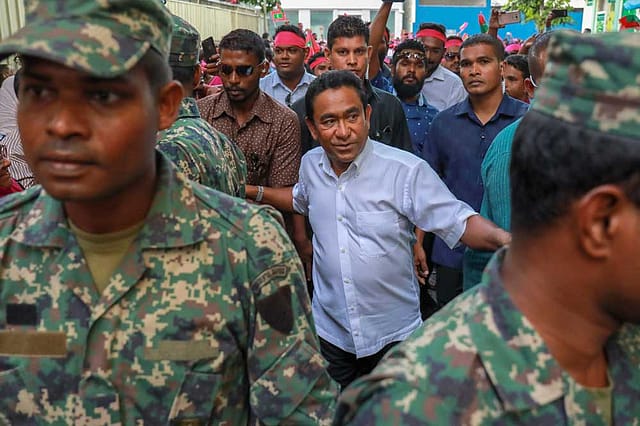The Question of Intervention

THE MALDIVES, A chain of islands in the Indian Ocean, is a country in trouble. President Abdulla Abdulla Yameen Gayoom recently declared a state of emergency for 15 days. Over the next two days, he had judges of the country’s supreme court, including its chief justice, placed under arrest. The crackdown left no one untouched, not even the president’s half-brother Maumoon Abdul Gayoom, a former president who ruled from 1978 to 2008.
Within no time, Abdulla’s predecessor Mohamed Nasheed—the only fairly elected leader of the Maldives— tweeted asking for Indian military intervention to restore democracy on the archipelago and also secure the release of all political prisoners, including former President Maumoon Gayoom. Nasheed lives in exile in Sri Lanka and is one of a clutch of leaders who were tried in absentia. The crisis was sparked off by the supreme court ordering their release. Abdulla did not comply and instead chose to impose an emergency.
So far, New Delhi has restricted itself to issuing a statement saying the rule of law must be respected. Unconfirmed reports suggest an expeditionary force is on standby in case India opts to dispatch it to Male. If that happens, it won’t be the first time it has intervened there. In November 1988, the Maldivian government sent an emergency request for help after a band of mercenaries tried to stage a coup there. Indian action was swift and decisive: President Gayoom was restored to power and Indian troops left quickly thereafter.
The present juncture is more complicated. For one, the request for intervention has come from a former president deposed in a quasi-military coup. For another, China has reacted and said India should not do anything even before Delhi has taken any step—either diplomatic or military.
2025 In Review
12 Dec 2025 - Vol 04 | Issue 51
Words and scenes in retrospect
What should India do? For one, it should calculate the pros and cons of taking military action carefully. If an intervention runs the risk of proving complex and costly, not taking any step will have visible costs as well. Much like the erstwhile imperial powers, China is currently erecting military bases on island chains in the Indian Ocean. Maldives is a well-known target. Beijing already has Djibouti and Hambantota in Sri Lanka under its control. If it throttles India’s sea lanes of the Arabian Sea, it would threaten the country’s economic independence. Delhi must pre-empt that possibility.
